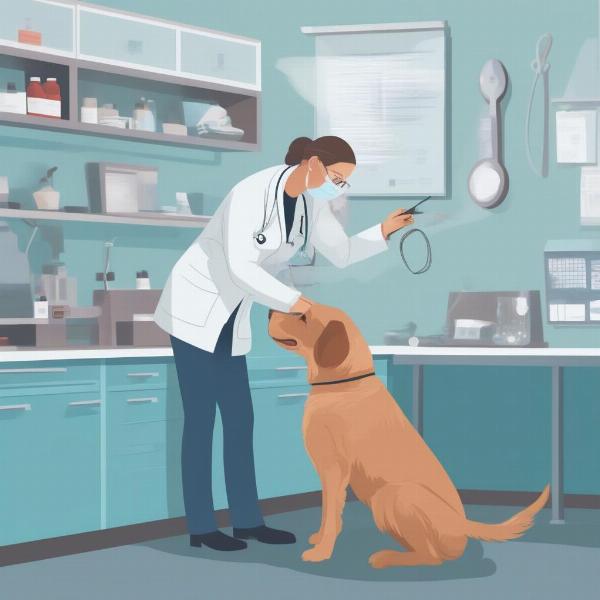Kratom for dogs is a topic surrounded by significant concern and a lack of conclusive scientific evidence supporting its use. While some pet owners may be curious about its potential benefits, it’s crucial to understand the potential risks and the lack of veterinary approval for this substance. This article will delve into the current understanding of kratom’s effects on dogs, the potential dangers, and safer alternatives for managing pain and anxiety in your canine companion.
Understanding Kratom and Its Effects
Kratom, derived from the leaves of a Southeast Asian tree, contains compounds that can interact with opioid receptors in the brain. In humans, it’s used for pain relief, anxiety, and even as a recreational drug. However, its effects on dogs are not well-studied and can be unpredictable. Some reported effects include sedation, vomiting, constipation, and even seizures. The lack of research makes it difficult to determine a safe dosage for dogs, further increasing the risk of adverse reactions.
The Dangers of Kratom for Dogs
The primary concern with kratom for dogs is the potential for toxicity. Because there’s no established safe dosage, even small amounts can cause adverse effects, particularly in smaller breeds. The variability in kratom’s potency adds another layer of risk. Furthermore, kratom can interact negatively with other medications your dog may be taking, leading to unpredictable and potentially dangerous consequences.
Is Kratom Ever Recommended for Dogs?
The short answer is no. Veterinarians generally do not recommend kratom for dogs due to the lack of scientific evidence supporting its safety and efficacy. The potential risks far outweigh any perceived benefits. If your dog is experiencing pain or anxiety, consult your veterinarian for safe and effective treatment options.
Safe Alternatives for Pain and Anxiety Management
Fortunately, there are several safe and effective alternatives to kratom for managing pain and anxiety in dogs. These include:
- Prescription Medications: Your veterinarian can prescribe pain relievers and anti-anxiety medications specifically formulated for dogs. These are much safer and more effective than using unproven substances like kratom.
- Behavioral Therapy: For anxiety-related issues, behavioral therapy can be highly effective. A certified dog trainer or behaviorist can help you identify the triggers for your dog’s anxiety and develop strategies to manage them.
- Natural Supplements: Certain natural supplements, such as CBD oil (under veterinary guidance), may offer some relief for anxiety. However, it’s essential to choose high-quality products and consult your veterinarian before using any supplements.
- Environmental Modifications: Creating a calm and predictable environment can significantly reduce anxiety in dogs. This might involve providing a safe space, using calming pheromone diffusers, or playing calming music.
What to Do If Your Dog Ingests Kratom
If your dog accidentally ingests kratom, contact your veterinarian or an emergency animal clinic immediately. Time is of the essence in these situations. Provide them with as much information as possible, including the amount ingested and any symptoms your dog is exhibiting.
 Veterinarian Examining Dog
Veterinarian Examining Dog
Conclusion
While the internet may be filled with anecdotal accounts of kratom’s use in dogs, it’s crucial to rely on scientific evidence and veterinary expertise. Kratom presents significant risks to dogs, and safer, more effective alternatives are available. Always consult your veterinarian before considering any new treatment for your furry friend. Their guidance is essential for ensuring your dog’s health and well-being.
FAQ
- Is kratom legal for pets? The legality of kratom varies depending on location, but its use in pets is generally not recommended by veterinary professionals.
- What are the signs of kratom poisoning in dogs? Signs can include sedation, vomiting, constipation, tremors, and seizures.
- Can I give my dog human-grade kratom? No, never give your dog human-grade kratom. The dosage and formulation are not appropriate for animals.
- Are there any long-term studies on the effects of kratom on dogs? No, there are very limited studies on kratom’s effects on dogs, particularly long-term studies.
- What should I do if I’m concerned about my dog’s pain or anxiety? Consult your veterinarian for appropriate diagnosis and treatment options.
About ILM Dog
ILM Dog (https://ilmdog.com) is your trusted international resource for all things dog-related. We offer expert advice on Dog Breeds and Selection, Health and Medical Care, Training and Behavior, Nutrition and Feeding, and Products and Accessories. We are committed to providing dog owners worldwide with reliable information to help them provide the best possible care for their canine companions. Contact us for any questions or concerns: Email: [email protected], Phone: +44 20-3965-8624.